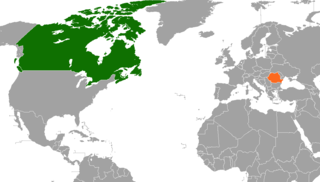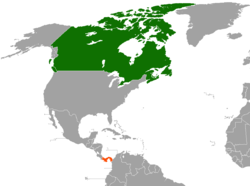
Panama's foreign relations are conventional in outlook, with Panama being especially aligned with United States since the 1989 US invasion to topple the regime of General Manuel Noriega. The United States cooperates with the Panamanian government in promoting economic, political, security, and social development through U.S. and international agencies.
Global Affairs Canada is the department of the Government of Canada that manages Canada's diplomatic and consular relations, promotes Canadian international trade, and leads Canada's international development and humanitarian assistance. It is also responsible for maintaining Canadian government offices abroad with diplomatic and consular status on behalf of all government departments.

The foreign relations of Canada are Canada's relations with other governments and nations. Canada is recognized as a middle power for its role in global affairs with a tendency to pursue multilateral and international solutions. Canada is known for its strong commitment to international peace and security, as well as being a mediator in conflicts, and for providing aid to developing countries. The "golden age of Canadian diplomacy" refers to a period in Canadian history, typically considered to be the mid-20th century, when Canada experienced a high level of success in its foreign relations and diplomatic efforts.

The diplomatic relations between Canada and the French Republic are friendly, the importance of which centres on the history of French immigration to Canada. Canadians of French heritage make up the majority of native speakers of French in Canada, who in turn account for about 22 percent of the country's total population. The small French Territorial Collectivity of Saint Pierre and Miquelon is situated off the coast of Atlantic Canada.

Canada–Ukraine relations are the bilateral ties between Canada and Ukraine.

Canada and Israel share bilateral diplomatic, commercial, and cultural ties. Canada recognised Israel on 11 May 1949, three days before the first anniversary of the Israeli Declaration of Independence, and currently maintains an embassy in Tel Aviv; Israel maintains an embassy in Ottawa and regional consulates in Montreal and Toronto.

Canadian-Romanian relations are the bilateral relations between the governments of Canada and Romania. Canada has an embassy in Bucharest. Romania has an embassy in Ottawa and three consulates-general. Romania has also three honorary consulate general in Moncton, Québec and Calgary.

Canada–South Korea relations are foreign relations between Canada and the Republic of Korea. Canadian soldiers participated in the defense of South Korea during the Korean War. Full diplomatic relations between Canada and South Korea were established on January 14, 1963. Canada has an embassy in Seoul, and a consulate in Busan. South Korea has an embassy in Ottawa and three Consulates-General, in Montreal, Toronto and Vancouver. Both nations are full members of APEC, OECD and the G20.

Canada and Japan have an amicable companionship in many areas. Diplomatic relations between both countries officially began in 1928 with the opening of the Japanese consulate in Ottawa. In 1929, Canada opened its Tokyo legation, the first in Asia; and in that same year, Japan its Ottawa consulate to legation form.

Full direct diplomatic relations between Canada and Colombia were established in 1953, with the exchange of the first ambassadors. Canada has an embassy in Bogotá, while Colombia has an embassy in Ottawa and four Consulates-General. Both countries are full members of the Organization of American States.

Canada and Chile established diplomatic relations in 1892. Both nations are members of the Asia-Pacific Economic Cooperation, Cairns Group, Organization of American States, and the Organisation for Economic Co-operation and Development.

Canada–Hungary relations are the bilateral relations between Canada and Hungary, the importance of which centres on the history of Hungarian migration to Canada. Approximately 300,000 Canadians have Hungarian ancestry. Both nations are members of NATO, OECD and UN.

Canada and Peru established diplomatic relations in 1944. Both nations are members of the Asia-Pacific Economic Cooperation, Cairns Group, Lima Group, Organization of American States and the United Nations.

Canada–Sweden relations are the interstate relations between Canada and the Kingdom of Sweden. They are founding members of the Arctic Council and have positive cultural and economic relations. In addition, there are more than 300,000 Canadians of Swedish descent. The relationship is backed with many mutual treaties, and sees moderate foreign direct investment and trade. One notable commonality for both Canada and Sweden are their commitments to feminist foreign policy.

Canada and Iran have had no formal diplomatic relations since 2012. In the absence of diplomatic representation, Italy acts as the protecting power for Canada in Iran and Switzerland acts as Iran's protecting power in Canada.

The Canada–Panama Free Trade Agreement is a free trade agreement between Canada and Panama that went into effect April 1, 2013. It was concluded on August 11, 2009, by Canadian Prime Minister Stephen Harper and Panamanian President Ricardo Martinelli and signed by the two countries' trade ministers on May 14, 2010. It was effective by December 2012, after both countries' parliamentary approval. The agreement eliminates Panamanian tariffs on 90% of goods from Canada. The remaining 10% will be phased out within the next ten years. Canada will remove 99% of its tariffs on goods from Panama, while keeping those on some imports of sugar, poultry, eggs and dairy products. Panama will end its ban on beef from Canada which was initiated after cases of mad cow disease were found in Canada in 2003.

Canada and Cuba have established diplomatic relations with one another since 1945, following their centuries-old informal trading relationship. Informal trade relations were established between the colonies of Atlantic Canada and the Captaincy General of Cuba during the 18th century. The informal trade relationship continued into the 20th century until formal diplomatic relations was finally established.

Canada—United Arab Emirates relations is used to describe the relations between the nations of Canada and the United Arab Emirates. Canada established relations with the United Arab Emirates in 1974. Each maintains an embassy in the other's capital.

Canada – Iceland relations are the international relations between Canada and Iceland. Both nations are members of the AC, NATO, OECD and WTO.

India–Panama relations are the bilateral relations between India and Panama.



















